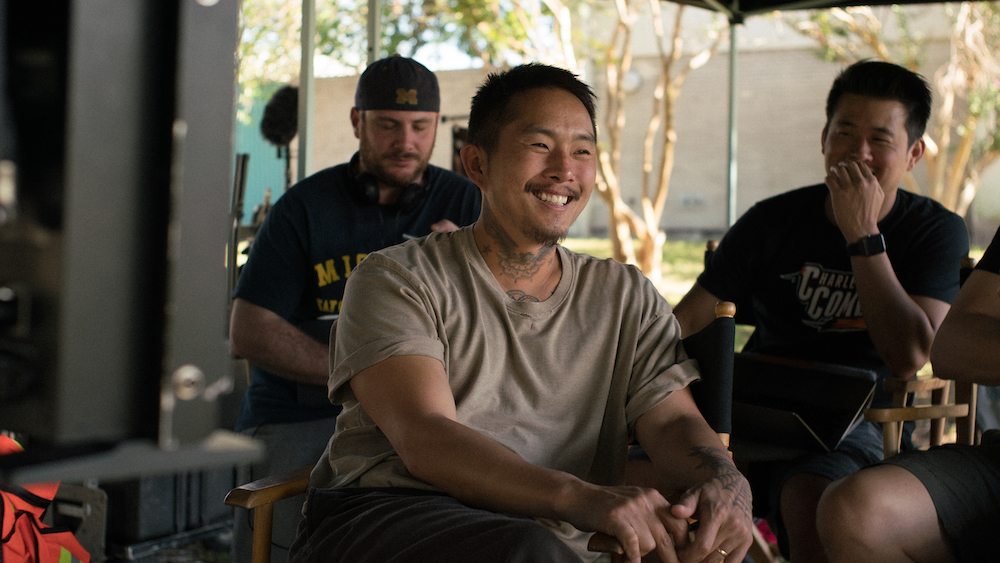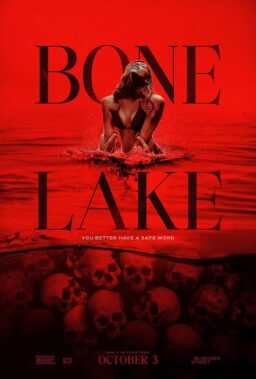“Blue Bayou” tells the harrowing story of an American we rarely see in film. Justin Chon’s Antonio LeBlanc, a Korean adoptee living in Louisiana, faces deportation to a country he doesn’t know after an altercation with a police officer. The possibility of being deported threatens to change the lives of his loved ones, like his wife Kathy (Alicia Vikander) and his daughter Jesse (Sydney Kowalske), whose biological father was one of the cops involved with Antonio’s incident. “Blue Bayou” follows Antonio as he faces his past and possible uncertain future with a court date looming, making choices that could help his family but also destroy their bond.
Chon not only leads this film, but fills its 16mm cinematography with his immense passion as a storyteller working as writer/director. Like with his Sundance breakout “Gook” and follow-up “Ms. Purple,” Chon’s love of distinct color and of an empathetic lens guides the viewer to see the world how Chon feels for it. “Blue Bayou” is Chon’s biggest film yet, and was screened Un Certain Regard at the recent Cannes Film Festival. He already has a TV series in the can (co-directing episodes of “Pachinko” with Kogonada), and just finished a new film in the state of Hawaii.
Chon spoke to RogerEbert.com about the making of “Blue Bayou,” how empathy drives his storytelling, the motivation to serve underrepresented communities, and more.
I talked to Alicia last week, and she said that when she was filming the singing scene that she was hiding her hand behind her back and it was shaking. I was wondering if you saw that when you were filming the scene.
I did not see that. She hid it quite well. I know she had a bit of hesitancy to the singing, and I was like, “You’re going to do great.” The big thing for me is, what was more important was her emotion. When she was singing, that was what was important. We did this dress rehearsal before we started filming that day, and she sounded wonderful. I was like, “Oh my god, I hit the jackpot!” Also something that maybe she didn’t say, is how cold it was that day. She’s wearing a summer dress, and it was freezing outside. So if you watch the film, you can see her breath, and for her to sing … the song is also a pretty high register, for her to sing under those conditions, she’s a true pro. And also she’s a fantastic singer.
She said great things about how you made her feel comfortable in other intense scenes, and I’m wondering: what’s most important for you as an actor, working opposite actors also as a director?
I think my first and foremost concern and thought is that I have to take care of the actors. I must make them feel comfortable, in order for them to do what they do, because they need confidence in your direction and your environment. So, I wanted them to feel like they’re in good hands. And then you kind of come last as a performer, you’re an afterthought, also because you’re directing. People forget that you’re also acting. That happened quite a lot on this film.
I’ve done it before, so I knew what to expect, but what I did was I did as much preparation that I had control over on the both directing side and the acting side so that there were less variables on the day. For example, with more complicated blocking I’ve tried to have more of an idea, but not so much that I’m going to lock the actors to something they’re not comfortable with. And then, the accent work I really worked on it a lot more intensely than I would if I had not directed, so I’m worrying about less things.
It sounds like when you’re on set, you’re not thinking … you’re trying to be more automatic in the performance.
Yes. I’ve done the work, and I just come in and play, but I need to be able to give direction. It’s a weird thing, it’s a weird skill to have! To still be able to watch the other actor and be able to give them notes while also being in the scene with them [laughs]. So you know, it’s a weird balance. The actors have to trust you, because they’re like, “You were in the scene, how the f**k would you know? You weren’t even paying attention in this scene.” So you have to gain the confidence of the actors that they know they’re in good hands.

I’m amazed by how much energy you put into these movies. Where does it come from on-set?
You know, after “Blue Bayou” I did a television series for Apple TV+, based on the book Pachinko. And I was able to do half of the season. And I just wrapped up two days ago on a film. But I’ve got to say with this last film, I feel like I was starting to run out of a little bit of steam. I think I need a bit of a recharge.
But for “Blue Bayou,” the idea that I’m trying to service a community of people that are underrepresented which is the adopted community, and also their experience in this country, and also the fact that some of them are facing deportation, I just don’t want to let them down. It’s about real people. I do think that’s where the energy comes from, I have a motivating factor and ultimately I will have to answer to them. There’s something in the back of my mind saying, “Hey, listen, you half-assed this, or you phoned this in, you’re gonna have to answer for it.” I think that’s a huge motivating factor.
Does that pressure inspire you then?
I do think it does, to a certain extent. I wanted to do justice for them, and I hope in the success of this film that we can change it in terms of them being allowed to stay in this country.
I saw in one of your recent Instagram stories actually, that you mentioned about films being machines for empathy.
That’s from you guys! That’s from Roger Ebert! Yes. I totally forgot where I picked that up from, but I just remembered today. So, I gotta start saying, “Just like Roger Ebert said …”
He would want you to have it! Especially as you started directing more, did empathy become more of a guiding principle? Do you think about empathy first and foremost?
Oh my god, it’s what rules everything for me. One of my goals is to bring empathy to my community, which is Asian Americans, and then secondly to all of us. I’m always trying to find how we can coexist in this country through my films, and that requires empathy. You look at “Blue Bayou,” and I even try to bring empathy to the cop, the dad, to the real biological father, and even to an ICE agent. That’s because I don’t want to alienate anyone, I want us to all know at the end of the day that we’re in this together. It’s just that we sometimes come from different walks of life.
Was there an evolution script-wise in how you wanted to present the cops? Or was it from the beginning that you wanted to show that not all cops are bad, so to speak?
Yeah, you know, my brother-in-law is a cop, my sister’s husband. They are not all bad, I promise. I know for a fact they’re not all bad. And at the same time, my family has dealt with the L.A. Riots, we got looted. That was also a direct response to the Rodney King beatings. We always have to play a little bit of devil’s advocate, right? We speak of empathy and we have to step inside other people’s shoes, maybe consider why they do what they do, or what they are feeling? Because we are all human. Even the most evil and vile of persons, I’m sure they have some sort of twisted justification for what they do, and nonetheless some of their own moral compass or justification that they operate by.
I think it’s more constructive at the end of the day, that we consider these things, instead of just thinking in black and white.

Do you think it’s more honest to how people are?
Yes, I do think so. Because you follow anyone to their home, and more often than not you’re going to realize that they are a mother or father, and have their hopes and dreams and worries. We’re all human.
Can you say any more about the film you wrapped, that you were shooting in Hawaii?
Yeah, it’s called “Jamojaya,” named after the Indonesian folk tale. It’s about a father and son who are Indonesian, and this son is just about to really blow up as a rapper, and his dad has been his manager his whole life. And he, in the film, has just fired his dad and hired an American manager and label. And essentially the film is a break-up story of father and son.
Wow. That sounds great. And it sounds like it’s of your interests, with its focus on parents, children, generations.
I also think that, I’ve now told three Korean-American stories, and “Blue Bayou” had a Vietnamese aspect to it. I do feel Southeast Asians have been underserved and underrepresented in American cinema, so I do think I should use my platform to maybe explore that other area of our community.
To read our interview with Alicia Vikander about “Blue Bayou,” click here. “Blue Bayou” will be available in theaters starting on September 17.












